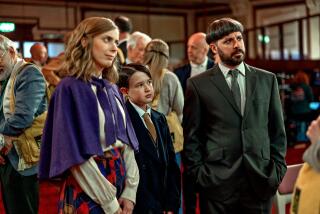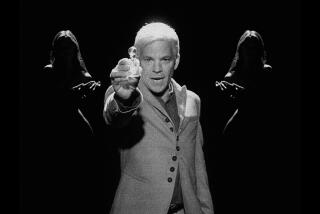‘Heaven’ Falls Into a Den of Inequities and Violence
“Heaven”--the other place is more like it--is a load of sicko, silly, ultraviolent trash. New Zealand writer-director Scott Reynolds spins one of those increasingly preposterous and bloody psychological drama plots but makes scarce attempt at plausibility and brings to it little sense of wit, absurdity or detachment. His straight-on approach in adapting Chad Taylor’s novel results in a depiction of folly and nastiness that’s swiftly repellent rather than entertaining.
Martin Donovan, venturesome veteran of American independents, plays the key figure, an architect in an unnamed city (Auckland in reality) who has wrecked his career and his marriage with compulsive gambling. (We never know how or why he got hooked.) In any event, he spends most of his time on the losing end of the poker table of Stanner (Richard Schiff), the brutal, tyrannical proprietor of a strip joint. One of Stanner’s performers is a glamorous transvestite (Danny Edwards) called Heaven, whose psychic powers he values, but that doesn’t keep him from treating Heaven brutally.
As it happens, both Donovan’s Robert Marling and Heaven are patients of one of those transparently evil psychiatrists straight out of a ‘40s movie, played by Patrick Malahide with the theatrical relish of a mustache-twirling villain in a Victorian melodrama. The psychiatrist is having an affair with Robert’s wife (Joanna Going) and advises her to hold out for a big divorce settlement from her destitute husband because he’s learned that Heaven predicts Robert will win big in the lottery. (Heaven has given Robert a tip because he saved Heaven from a pair of crazed, savage thugs hired by Stanner to burn down the strip joint for the insurance; the thugs contribute a large share of the film’s abundant violence.)
This is, believe it or not, just the beginning of the complications and coincidences--and the start of lots of questions on the part of the viewer. Why does Robert hang out with the odious Stanner? Can’t he gamble with a more palatable individual? What makes Heaven stick with the vicious guy? Why do Robert and Heaven both go to the same, equally unsympathetic therapist? Why should Robert, a man on the skids if ever there was one, deserve to have custody of his small son simply because he loves his kid? Not surprisingly, the film’s lack of credibility escalates as it seems to be asking us to take all that it depicts all too literally.
Ludicrousness compounds ludicrousness, laying waste to the considerable talent of Donovan and the striking presence of Edwards, both of whom belong in an infinitely better movie. Like so many young filmmakers, Reynolds, who has an undeniable visual flair, draws so much from other movies that not a whiff of real life can intrude in this grisly fantasy.
* MPAA rating: R, for vicious, bloody violence including rape, pervasive strong language, and sexuality/nudity. Times guidelines: The film is so savage you have to wonder what the NC-17 is being reserved for.
‘Heaven’
Martin Donovan: Robert Marling
Joanna Going: Jennifer Marling
Patrick Malahide: Melrose
Richard Schiff: Stanner
Danny Edwards: Heaven
A Miramax Films presentation of a Midnight Films production. Director Scott Reynolds. Producer Sue Rogers. Executive producers Bob Weinstein and Harvey Weinstein. Screenplay by Reynolds; from a novel by Chad Taylor. Cinematographer Simon Raby. Editor Wayne Cook. Music Victoria Kelly. Costumes Emily Carter. Production designer John Girdlestone. Running time: 1 hour, 34 minutes.
Exclusively at the Sunset 5, 8000 Sunset Blvd., West Hollywood, (323) 848-3500.
More to Read
Only good movies
Get the Indie Focus newsletter, Mark Olsen's weekly guide to the world of cinema.
You may occasionally receive promotional content from the Los Angeles Times.










